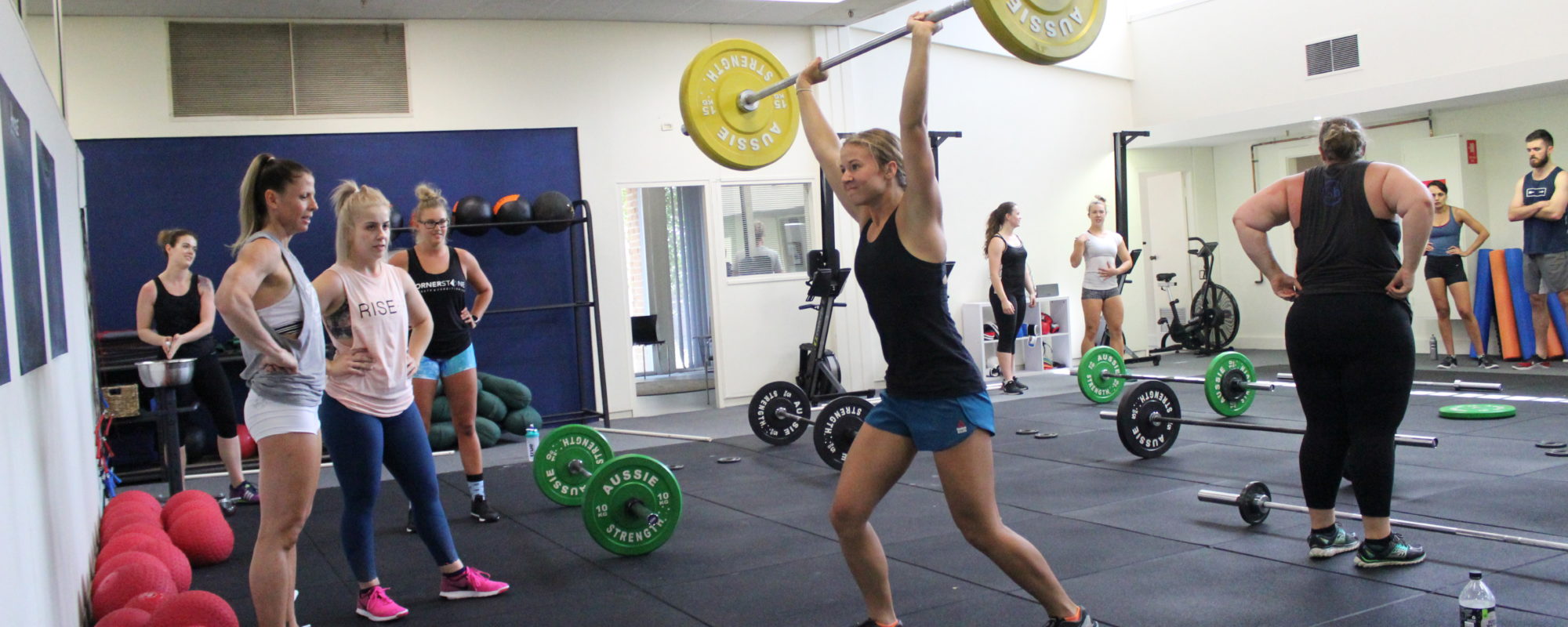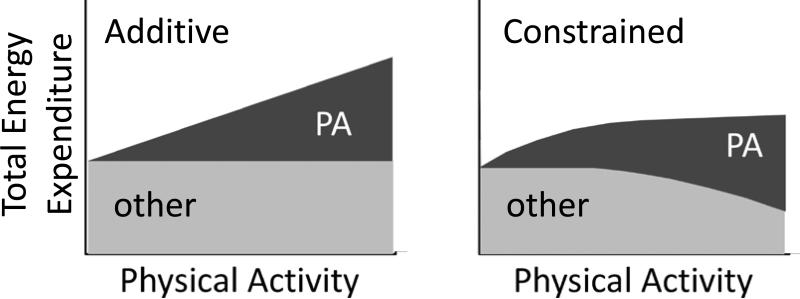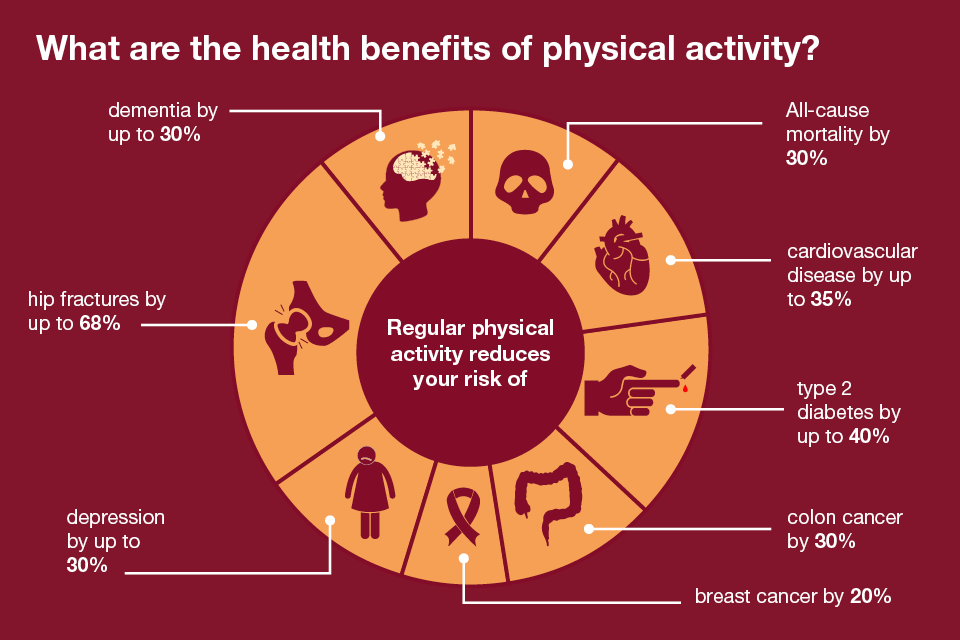If you want to lose weight, you should be doing a moderate amount of exercise and focusing on eating well.
In short, if you aren’t exercising at all then get started on an exercise program a few times per week.
If you are currently exercising regularly, increasing your number of sessions per week to six or seven or even trying to fit in two workouts per day is unlikely to be helpful and may even leave your weight loss in more of a stalemate than before!
But surely more exercise is better you say?
Not necessarily.
![]() Increasing exercise to more than moderate amounts per week (say daily or twice daily) does not increase the number of calories you burn in a day – your body adapts. (Sorry)
Increasing exercise to more than moderate amounts per week (say daily or twice daily) does not increase the number of calories you burn in a day – your body adapts. (Sorry)
![]() You naturally feel the need to eat more calories, are more likely to sit around for the rest of the day, skip the stairs, fidget less and even some internal functions slow down to conserve energy.
You naturally feel the need to eat more calories, are more likely to sit around for the rest of the day, skip the stairs, fidget less and even some internal functions slow down to conserve energy.
![]() Don’t quit! Exercise is absolutely life-changing and often life-saving and there are SO many health reasons to exercise regularly (see bottom of article).
Don’t quit! Exercise is absolutely life-changing and often life-saving and there are SO many health reasons to exercise regularly (see bottom of article).
![]() HOWEVER… if this is your only weight loss strategy, you’re in trouble!
HOWEVER… if this is your only weight loss strategy, you’re in trouble!
Why? As the authors of one study stated: “Weight loss resulting from an exercise intervention tends to be lower than predicted…” (4)
There is a growing body of evidence to suggest that the old “energy in, energy out” rule should be re-written so as not to fool exercisers into believing they can expect great weight loss results from physical activity alone.
The current Australian movement guidelines recommend the following:
Each week:
- 150 minutes (2 1⁄2 hours) of moderate intensity physical activity, or
- 75 minutes (1 1⁄4 hours) of vigorous intensity physical activity, will help improve blood pressure, cholesterol, heart health, as well as muscle and bone strength.
Each week, increasing to:
- 300 minutes (5 hours) of moderate intensity physical activity, or
- 150 minutes (2 1⁄2 hours) of vigorous intensity physical activity, will provide greater benefits and help to prevent cancer and unhealthy weight gain. (5)
Keep in mind that “moderate intensity” activity examples include a brisk walk or golf and that “vigorous intensity” examples include jogging and tasks that involve lifting or carrying. Given these examples you could say that high intensity sports, training for a triathlon or doing cross-training sessions would be considered ‘extremely vigorous’.
One study suggests that using a program that meets the recommendations of most governing health bodies, you might be able to expect a weight loss of… about 2 kilograms! (1) “Mean weight loss observed (with exercise) is modest and sometimes far less than what the individual expected. The individual responses are also widely variable, with some individuals losing a substantial amount of weight, others maintaining weight, and a few actually gaining weight.” (3)
With all this unfortunate news, and using the “energy in, energy out” rule, it seems current recommendations just aren’t enough – surely we should be exercising more and ‘extremely vigorously’ if we want to actually lose weight? Well science would say no.
“Total energy expenditure increases with physical activity at low activity levels… but PLATEAUS at higher activity levels as the body adapts to maintain total energy expenditure within a narrow range.” (2) Apparently the ‘energy in, energy out’ rule of thumb only works up to a point.
“Rather than increasing total energy expenditure linearly in response to physical activity, (i.e. the more exercise, the more energy out), individuals tend to adapt metabolically to increased physical activity.” Behavioural changes such as eating more calories and generally being more sedentary when not exercising are common in individuals who exercise past moderate levels. Of course we have some control over these things which may explain why weight loss from exercise is so variable.
However, as well as these external changes, the body actually adapts internally to keep energy expenditure from blowing out of proportion. “Men and women enrolled in a long-term exercise study exhibited reduced basal metabolic rate (the amount of energy burned just to survive) at week 40”, meaning their ‘energy out’ dropped even though they were still exercising, and “studies in healthy adult women have shown suppressed ovarian activity and lower estrogen production in response to moderate exercise.” (2)
So if moderate exercise might produce a little bit of weight loss, and doing more exercise doesn’t necessarily produce any additional weight loss… then why exercise at all?!
Well there are plenty of reasons, in fact starting an exercise routine could be the most beneficial thing you can do to improve your health. Benefits include stronger muscles and bones, reduced inflammation, a positive influence on gut bacteria and improved mental health and happiness – all of which are able to assist weight loss efforts in their own right. When it comes to shifting kilos long term, a combination of exercise and healthy eating seems to work better than just using one approach or the other.
“At a long term follow up (over one year), relatively high protein, moderately low calorie, low glycemic index diets, associated with a daily, moderate intensity, physical exercise (of at least 30 min), appear to be more successful in limiting long term relapse, maintaining fat free mass and achieving the highest fat loss. Diet alone or physical exercise alone does not produce similar results.” (3)
So, the science clearly tells us that diet is by far the most important factor in weight loss. But without even looking at the science, simply looking around at the gym community, it’s easy to see why combining exercise and healthy eating to lose weight is the best approach. It’s like anything in life, things tend to all be going right, or all be going wrong at the same time. It’s so common for a little slip-up in a healthy diet to induce a full blown eating binge or a day missed at the gym cascade into a very lazy month. However, the more things we can set right, the better the results all round. Exercise makes people feel better about themselves both mentally and physically. Pains and niggles that may prevent someone from exercising can often be improved with exercise alone, while sitting for long periods and avoiding physical activity tend to make those pains and niggles even worse. The improved confidence and overall mental state that comes from regular exercise increases the likelihood that someone will continue with their efforts to improve their health. And importantly exercise encourages and re-inforces our healthy eating choices.
Check out our 28 day intro challenge package.
References:
“The role of exercise and physical activity in weight loss and maintenance.”Swift DL1, Johannsen NM2, Lavie CJ3, Earnest CP4, Church TS5.
2. “Constrained Total Energy Expenditure and Metabolic Adaptation to Physical Activity in Adult Humans” Herman Pontzer,Ramon Durazo-Arvizu,Lara R. Dugas,Jacob Plange-Rhule,Pascal Bovet,Terrence E. Forrester,Estelle V. Lambert,Richard S. Cooper,Dale A. Schoeller,Amy Luk
3. Med Sci Sports Exerc. 2013 Aug;45(8):1600-9. doi: 10.1249/MSS.0b013e31828ba942. Resistance to exercise-induced weight loss: compensatory behavioral adaptations.
4. Obes Rev. 2012 Oct;13(10):835-47. doi: 10.1111/j.1467-789X.2012.01012.x. Epub 2012 Jun 11. Why do individuals not lose more weight from an exercise intervention at a defined dose? An energy balance analysis.




 (2)
(2)
